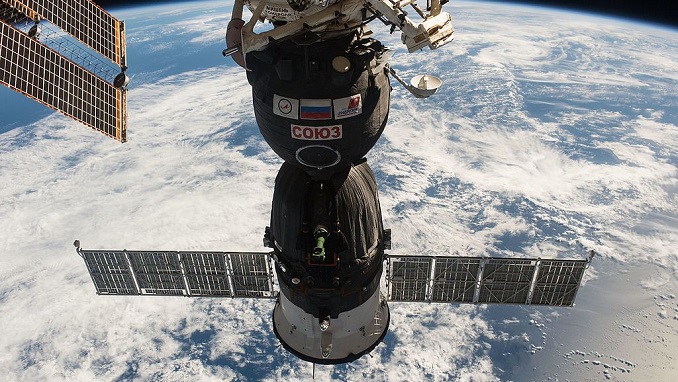In a new setback for Russia’s space program, an unmanned spacecraft carrying Russia’s first humanoid robot, Fyodor, to be sent into orbit failed to dock at the International Space Station (ISS) on Saturday, AFP reported citing a NASA statement.
“Russian cosmonauts issued a command to abort the automated approach of an uncrewed Russian Soyuz spacecraft to the International Space Station,” said the U.S. space agency, which operates the ISS together with Russia’s Roscosmos and agencies of several other countries.
“The craft was unable to lock onto its target at the station,” and “backed a safe distance away from the orbital complex while the Russian flight controllers assess the next steps,” NASA said.
Russian flight controllers had told the ISS crew it appeared the problem that prevented automated docking was in the station and not the Soyuz spacecraft, NASA added.
The docking had been scheduled for 0530 GMT but a live broadcast of the event on the website of the Russian space agency Roscosmos was interrupted when the Soyuz approached about 100 meters (yards) off the ISS.
Russian news agency RIA Novosti reported on Monday that Russian cosmonaut Alexander Skvortsov, who is onboard the station, has reloaded the Soyuz MS-13 spacecraft from one module of the ISS to another, which will make it possible to make a second attempt to dock the Soyuz MS-14 with the Fyodor robot.
“The Soyuz is on a safe trajectory above and behind the space station that will bring it in the vicinity of the orbital complex again in 24 hours and 48 hours,” NASA said. Roscosmos director Dmitry Rogozin said on Twitter a new attempt would be made to dock the craft on Tuesday morning after earlier reports said this would take place Monday. “The situation is difficult, but under control,” he said.
Last October, a Soyuz rocket carrying an American and a Russian had to make an emergency landing shortly after lift-off – it was the first failure in the history of manned Russian flights.
The life-size robot named Fyodor, short for Final Experimental Demonstration Object Research, is the first-ever sent up by Russia. Fedor blasted off Thursday in a Soyuz MS-14 spacecraft from Russia’s Baikonur Cosmodrome in Kazakhstan and was to stay on the ISS until September 7 learning to assist astronauts in the space station.












